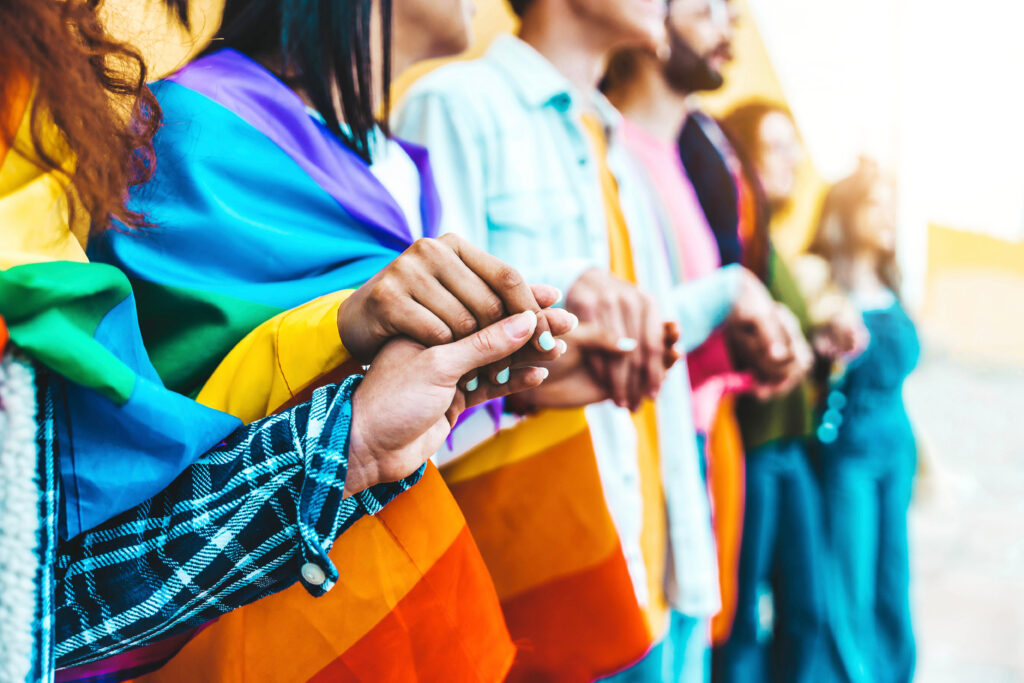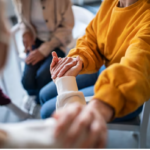During Pride Month, we celebrate the history, culture, and contributions of the LGBTQ+ community.
In recognition, we share free mental well-being resources that support mental health in the LGBTQ+ communities. Breaking down stigma is vital in opening doors for LGBTQ+ mental health support.
While we share during Pride Month, the resources below are accessible year-round, as mental health support for LGBTQ+ communities carries year-round importance. Everyone deserves access to free mental health resources.
If you are experiencing a mental health crisis, call or text 988. Learn more about 988.
Organizations & Associations
- American Psychological Association (APA): Provides educational and support resources on a range of LGBT topics
- Association of Gay and Lesbian Psychiatrists: A community of psychiatrists that educates and advocates on LGBTQ mental health issues
- Depression Looks Like Me: Education for, and empowerment of, LGBTQ+ people with depression
- LGBTQ+ Healthcare Directory (Mental Health tab): A search tool that can locate LGBTQ+-inclusive mental health care providers
- LGBT National Help Center: Offers confidential peer support connections for LGBT youth, adults and seniors, including phone, text and online chat
- Society for Sexual, Affectional, Intersex, and Gender Expansive Identities (SAIGE): Delivers educational and support resources for LGBTQ individuals and promotes competency on LGBTQ issues for counseling professionals
Youth and Young Adults
- Rainbow Youth Project: A nonprofit organization that promotes the health, safety, and wellness LGBTQIA young people throughout the United States
- True Colors United: Working to end homelessness among LQBTQ youth
Communities of color
- BlackLine: Provides a space for peer support, counseling, reporting of mistreatment, witnessing and affirming the lived experiences for folxs who are most impacted by systematic oppression with an LGBTQ+ Black Femme Lens.
- DeQH Helpline: 100% confidential support for South Asian LGBTQ individuals in the United States
- INARA Helpline: 100% queer & trans Muslim support line
- Work2BeWell: Teen BIYOC-JEDI: These modules introduce conversations on structural racism, activism & advocacy, stigma and intergenerational trauma, equity and inclusion
Older Adults
Transgender communities
- Pink Manta Ray: Resources to advocate for trans inclusion, radical body acceptance, and mental health awareness
- The National Center for Transgender Equality: Resources for transgender individuals, including information on the right to access health care.
- Trans Lifeline: Connects trans people to the community support and resources we need to survive and thrive – 877-565-8860
Podcasts & videos
Allyship
- GLAAD: Terminology guide for allies of the LGBTQIA+ community
- Human Rights Campaign: Guide to allyship
Crisis Support
- THRIVE Lifeline: A text-based crisis line staffed by people within, and to support, marginalized identities.
Facts and Statistics
According to the Trevor Project’s 2024 Survey U.S. National Survey on the Mental Health of LGBTQ+ Young People, LGBTQ+ teens are at a higher suicide risk than their peers. “LGBTQ+ young people are not inherently prone to higher suicide risk because of their sexual orientation or gender identity. Rather, they are placed at higher risk because of how they are mistreated and stigmatized in society.”
NAMI reports that people in the LGBTQ+ community struggle in silence due to barriers to care — and face worse health outcomes as a result.
- The LGBTQ+ population is at a higher risk than the heterosexual, cisgender population for suicidal thoughts and suicide attempts.
- High school students who identify as lesbian, gay or bisexual are more than four times as likely to have attempted suicide compared to their heterosexual peers.
- 40% of transgender adults have attempted suicide in their lifetime, compared to less than 5% of the general U.S. population.






